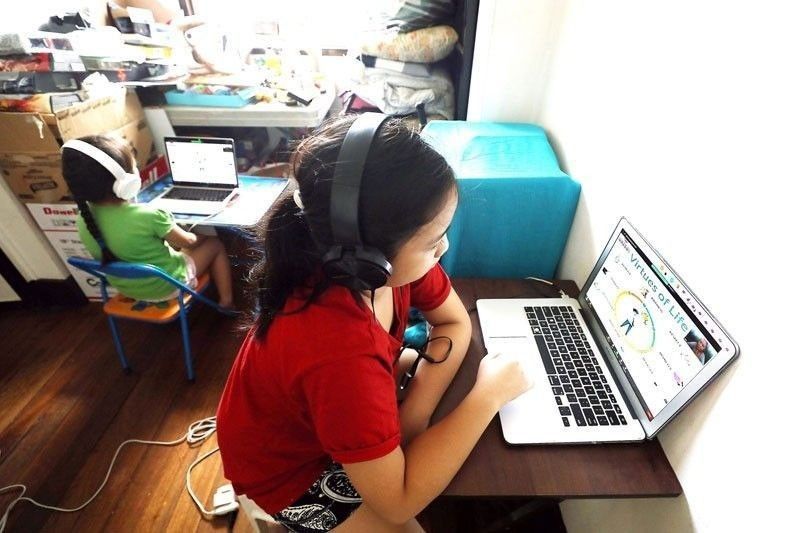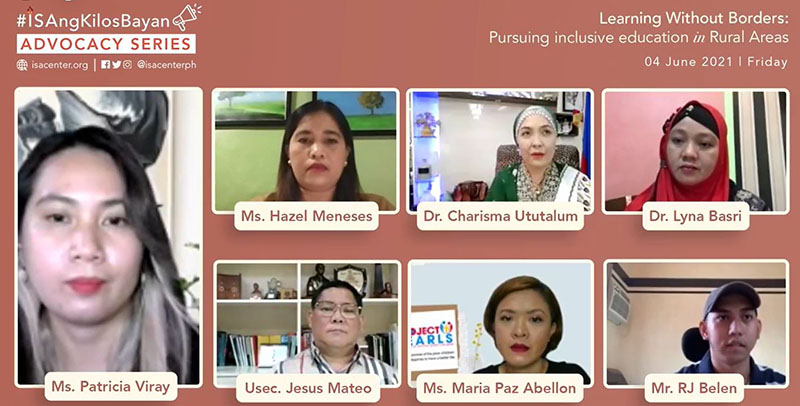#ISAngKilosBayan: Pursuing inclusive education in rural areas

MANILA, Philippines — Students are among the ongoing pandemic's most severely impacted and overlooked victims, with over 1.5 billion affected learners worldwide.
Educational institutions, which once served as their second home, closed their doors to students in the Philippines. The shift to distance learning caused major problems in a country where more than half of all families live in the poverty line, especially for students in the rural areas to push their right to education.
In partnership with Philstar.com, the Institute for Solidarity in Asia (ISA) launched a new segment under its #ISAngKilosBayan Advocacy Series, this time, to shed light on the challenges in sustaining education in the rural areas. ISA gathered education leaders across the country namely Hazel Meneses (principal, Sta. Fe National High School), Charisma Ututalum (SUC president II, Sulu State College) and Lyna Basri (principal, Basilan National High School) to discuss the impact of the ongoing crisis on the learning development of students in remote areas.
The webinar also featured Usec. Jesus Lorenzo Ruiz Mateo (undersecretary for Planning and Human Resource and Development Organization, Department of Education), Maria Paz Abellon (Education and Literacy Program Director, Project Pearls) and RJ Belen (Alumni Ambassador, Teach for the Philippines) as reactors and Patricia Viray (news editor, Philstar.com) as moderator.

The COVID-19 educational disruption
On March 15, 2020, schools in the country were shut down due to the pandemic, abruptly interfering with every learner's education. The closures, however, affected students unevenly, with many learners in the rural areas lacking access to the needed supplies and gadgets required by the new learning format.
For Ututalum of the Sulu State College, the pandemic unexpectedly and dramatically changed their roles as education leaders.
“I felt like we were actors in a stage play, and then suddenly we were asked to stop, and then change our stories, change our scripts, and even our costumes. And then we were asked to go back to the stage again and continue the play, but this time, without a director. You can imagine us playing a role which is new to us,” she said.
Meneses of the Sta. Fe National High School detailed how the impact of the COVID-19 pandemic on education varied from urban areas to rural areas.
“In our case, we’re actually in a dilemma on how we are going to cope with the available resources we have and the economic status of our learners. Many of our learners come from poor families that have no access to internet connection and whose families cannot provide laptops and other gadgets that can be used for online learning, and with limited financial sources,” she said.
Addressing the digital divide
While online learning helped stop the spread of the virus by avoiding direct interactions, it made the digital educational divide in rural areas more pronounced than ever.
According to Basri of the Basilan National High School, finding alternative ways to pursue education in the online learning format was no easy feat, but with the help of national government agencies and local media, their institution thrived even amid the crisis.
“I had this conversation with the DICT [Department of Information and Communications Technology] in the province of Basilan for us to have an internet connection that is free for all. For [the enrollment], we tapped again the expertise of DICT, and that was the time that...made us decide what kind of modalities we should be instituting in our institution. Do they have an internet connection? Do they have a television? We even tapped the media [radio] for the announcements, for them to tell the learners to go online,” she said.
Meanwhile, Meneses recognized that most of their students had little to no access to the internet, prompting them to think outside the box.
“For those students na walang cellphone at internet connectivity, our teachers actually visit our learners in their respective homes. Nagvi-visit sila and minsan nagca-class kaya lang, it’s very limited and the time is limited. But nevertheless, we are exerting all our efforts to reach all our learners and so that they can continue with their studies,” she said.
The digital divide, however, was not limited to the learners alone. According to Ututalum, their faculty members had to undergo retraining and immerse themselves in the digital ways of teaching.
“When we started to research, we learned that there is Google Classroom and Edmodo. And then we conducted a training for our faculty because everyone doesn’t know [Google Classroom and Edmodo]. It is also important to listen to our faculty because when we introduced many tools to them, they had a hard time memorizing or doing their expertise on each tool. We decided that our computer programmers themselves [make] our own e-learning system designed for Sulu State College,” Ututalum said.
No student left behind
For the Sta. Fe National High School, Meneses noted that despite expecting a decrease in enrollment, the institution reported a 4.68% increase for high school enrollees. The milestone, however, was no glitch nor a mere coincidence but a result of a tireless effort on the faculty’s end.
“Since we are trying to determine the modality, nagkaroon kami ng online enrollment but for those na walang internet, ang ginawa namin vinisit namin sila sa respective homes and conducted survey and learner’s mapping. Gumamit kami ng student ID with QR code at nate-trace namin ‘yung mga batang active pa ‘din sa accomplishments of modules. If hindi na active, the teacher or adviser visits them para makita yung bata,” Meneses said.
To ensure that no student is left behind, Ututalum sought the help of their local government units and found a way to reach out to all their affected students.
“After the enrollment, there were at least 1% who did not continue to enroll. We found out they can't afford to get their modules. We went to the municipalities where our students were affected and talked to their mayor and asked for help. They offered to get the module in our institution and be distributed by the barangay captains where the students were and asked them to enroll again,” she said.
Lessons learned
Usec. Mateo, one of the webinar’s reactors, echoed the sentiments of the administrators, adding that no problem is too difficult through teamwork.
“If you look back, the COVID 19 pandemic has imposed a severe and devastating impact in all sectors. So these effects are immensely felt in our department,” he said. “We will still continue to face a lot of challenges. I am also reminded by the walis tingting (Filipino broom stick). 'Pag buo siya, it is matibay and that is precisely what is happening right now. So if we continue to work together, we will surmount it,” he said.
For Ututalum, the key attributes that educators must possess in these challenging times are the ability to lend an ear to all stakeholders and flexibility in implementing directions.
“The first lesson we learned is we should always be flexible for faculty and students. One size fits all does not apply to us. We have to invest in our teachers. We need to train and listen to them. For the government, they have to address access to internet connection because this is our main problem here,” she said.
Ultimately, Meneses reminded everyone that despite catching us off guard, the pandemic is not an excuse to limit ourselves and lose hope.
“We really need to collaborate with them and hindi mag-isa lang dahil mahirap yung nag-iisa especially this time of pandemic. None of us is ready to face this pandemic so we should not lose hope and look into the brighter side in every challenge we face. There is still hope and we can innovate more.”
- Latest
- Trending
































